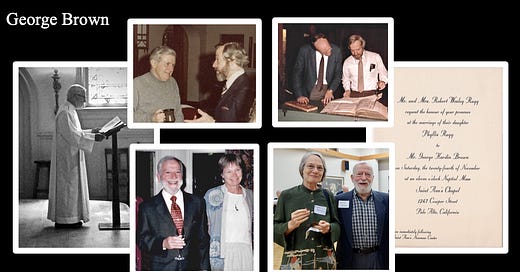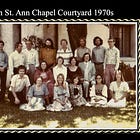Part IV: "The Remarkable Sixty-Year Survival of Prof. Mahrt's St. Ann Choir"
In the left photo above taken in the 1990s, Professor George Brown is acting as a lector at St. Thomas Aquinas Church. From 1962 to 1971, Brown was an ordained Jesuit priest in the Roman Catholic Church. After he received a doctorate from Harvard, and after his laicization, in 1971, Brown became an Assistant Professor in the Stanford English Department, a well-respected medievalist who specialized in Venerable Bede. From the time he arrived at Stanford, Brown served the choir as liturgical master of ceremonies and lector until ailments in the years before his death in 2021 prevented him from continuing.
You can read a loving eulogy for Professor Brown by Alison Altstatt here. Here is an excerpt about his marriage to Phyllis Rugg, Professor of English at Santa Clara University. (Two photos of the Browns and their wedding invitation are shown in the above image. The photo on the right of the couple was taken at William Mahrt’s 80th birthday party.)
I distinctly remember my parents’ joy when they learned that George had met someone special. We were all delighted to meet Phyllis who was as beautiful as she was brilliant, vivacious, kind, and very funny. I was thrilled to carry Phyllis’s train in their wedding at Saint Ann Chapel.—Alison Altstatt
In the next photo to the right, Professor Brown is with Sulpician Father Robert Giguerre, who became the Associate Pastor of St. Ann Chapel in 1974. According to Susan Altstatt, he initially opposed the sung Latin Mass but grew to be a supporter and dear friend of the choir.
In the right photo in the top row, William Mahrt and George Brown look over a manuscript. The date on the back of the photo is DEC 83.
Incidentally, Professor Mahrt, some choir members, and friends of the St. Ann Choir often remark that a good thing about the choir is that many of its members are not Catholic. Traditional Catholics like myself may wonder at the appropriateness of including non-believers in a choir, which performs a liturgical function. But the idea of inclusiveness appeals to many both inside and outside the Catholic Faith. As Early Music singer Miriam Palm explained to me, “The non-Catholics are loyal to Bill and love the music.”






